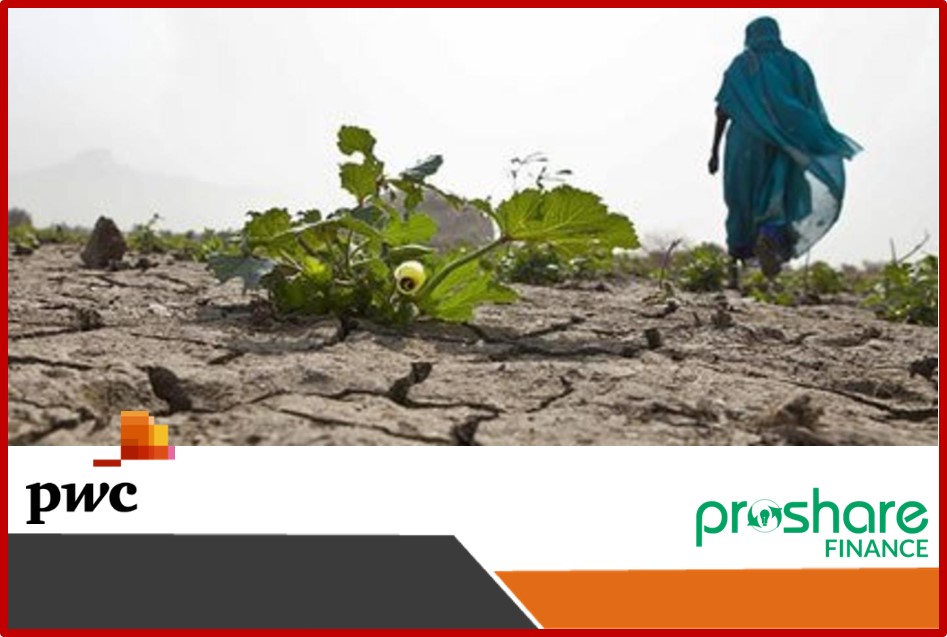Tuesday, January 26, 2021 / 08:20 AM / By PwC Nigeria/ Header Image Credit: AfDB
Introduction
In our previous articles, we were able to establishhow climate change will affect the Nigerian insurance sector and how insurersshould stand up to the roles they will have to play in the coming years.However, responding to the impact of climate change on the insurance space;insurers, regulators as well as other stakeholders will need to design anadequate approach to help manage the risks that might arise.
The Climate Change Risks
According to the 2015 Bank of England PrudentialRegulation Authority report1 , climate change will lead to three primary risks.These risks, though well discussed in one of our past articles titled, "Impactof Climate Change on the Nigerian Insurance sector"2 , are briefly highlightedbelow:
Physical Risks: These are risks that are caused as a result of weather-related eventssuch as storms, floods, earthquakes, hurricane, cyclones etc. The mostrelatable events in the case of Nigeria are rainstorms and floods. These riskshave a large direct impact on insurance businesses.
Transitional Risks: These are financial risks that are likely to be imposed as a result ofthe adoption of a lowcarbon economy and there exists a global climate changegoal of keeping below a '20C carbon budget'. This goal has caused thegovernment of various countries to set up policies to align with the globalgoal and insurance firms tend to have participated in discussions on suchpolicies.
Liability Risks: These are risks where an insurer tends to provide coverage for apolicyholder who is legally liable to compensate a third party due to any formof damage or injury caused. Having to indemnify any types of liability riskscan cause business disruption for insurance businesses.
This article focuses on our first step considerationsin responding to the identified climate change risks. The focus is on riskmanagement from the regulator's and the insurer's approach.
Regulator's Approach
The risks posed to insurers as a result of climatechange is an ongoing discussion between insurers, regulators and otherstakeholders. In dealing with these risks; regulators, insurers and otherstakeholders need to collaborate immensely in order to establish a structure indealing with climate change risks.
Our last article "Climate change: Roles of InsuranceBusinesses in Nigeria"3 highlighted some instances in which the insurers andregulators could collaborate to address some of the risks encountered byinsurers as a result of climate change. As a result of this collaboration,regulators should create a structure to help insurers ease the process ofadapting to the impact which will be caused by climate change risks.
Regulators in managing the impact of climate changerisk could consider the following approach to reduce or eliminate the risksposed by climate change;
- Regulators should mandate insurers to integrateclimate change risks into their existing enterprise risk management. It isnecessary for regulators to ensure that every insurer embeds climate change intheir existing principles-based risk management framework. This is to show howthey want the insurance sector to be prepared for future climate change andmitigate against its negative effects on insurance businesses at large.
- Introduction of codes of practice, which could beused to ensure that climate change risks are accounted for by insurers as partthe process of writing insurance products. The aim of this code of practice isensure that insurers are aware of the climate change risk as well as otherrisks while writing an insurance product.
- Regulators should facilitate a clear, comparable andconsistent disclosure by insurers on risks and opportunities presented byclimate change. This could be in the form of a mandatory disclosure about theimpact of climate change on insurance risk and climate change risks to motivateentities to assess risks and provide information to consumers/users about thoserisks.
Insurer's Approach
The ravaging effects of climate change on the societytoday has seen insurance as a panacea for managing the risks that the societyitself would be unable to manage. For instance, the property of people situatedin areas where floods and rainstorms are very prevalent, might leave the ownerswithout hope of recovery if insurance coverage is not in place. The societytends to rely on insurers to help salvage their loss situations and bring themback to their initial position. This therefore means that insurers are the riskmanagement tool for the society in tackling climate change effects.
In our last article "Climate change: Roles ofInsurance Businesses in Nigeria"3 , we clearly explained what roles insurersare positioned to play since the society relies on them in mitigating the aboveidentified risks. However, insurers will need to design a risk managementprocess that will help them to begin to adapt to climate change in order to useit to their advantage as failure on that part can potentially wreck theirlong-built businesses.
This section focuses on the risk assessment processthat can help insurers to plan their steps for them to begin to adjust, adaptand prepare for future climate change. Some insurers will only beshort-changing themselves if they ignore the existence of climate change andfail to take steps towards it.
Risk assessment forclimate change adaptation
Insurers have been able to understand the potentialimpacts climate change will pose on their business but now, they need to developa solution-based approach that will assist their adaptation planning inaddressing climate change. Their risk management objective for climate changewill be essential in the planning phase. We will focus on three risk assessmentlayers.
The first layer is about gaining a prefatoryunderstanding of the climate change risks faced by their organisations: It isquite necessary for each insurer to develop a research and knowledge basedcentre on climate change within their system of operations. This will helpworkers develop a high-level understanding of climate change risks.Enlightening each unit will help to generate ideas on what product types can bedeveloped, what should be adjusted in their current products policies, howunderwriting certain products should change, what assumptions should befactored in when reviewing products prices, what assets should investments bechanneled towards etc. All of these will only be beneficial when insurers takeit upon themselves to enlighten every unit in their organisations.
The second layer is about conducting an in-depth riskanalysis: Insurers should identify and evaluate the specific climate changerisks that they are more susceptible to (from the knowledge of the state oftheir businesses), assess the possible immediate and future likely occurrenceand how each unit of their business will be affected. The use of scenariotesting and sensitivity testing analysis will aid their assessment andconducting these analyses will require professionals such as actuaries, riskexperts etc. This way, the business operations and strategy decisions ofinsurers at the top management levels will be heightened and help price relatedproducts appropriately.
The third layer is about understanding thevulnerability of various business units to climate change hazards: Part of therisk management process is for insurers to understand the extent to which eachbusiness unit will become vulnerable so that measures can be put in place forthem to continue to have a smooth ride. For instance, the investment unit willneed to become aware of the investment assets that will have to change in orderto match the liabilities(claims) that will be incurred as a result of climatechange occurrence. Also, underwriting oil & gas lines of business mayrequire some drastic changes as transitioning into a low-carbon economy willgreatly impact the energy sector. A broad risk assessment from the second layerwill be required because the risks that each business unit will be exposed toshould be known early in this risk management step.
Conclusion
It is not enough to just identify risks and itseffects on businesses and society at large regarding climate change. There areexpected steps that should be taken to show the responses given to theidentified risks. A proactive conversation should be initiated by either theinsurers, regulators as well as other stakeholders as regards managing therisks originated by climate change to aid proper capturing of all the riskexposure of an insurer. The regulators and insurers should begin with what weconsider as the first step in managing the risks that exist as a result ofclimate change.
Credit:
The post RiskManagement: Next Step for Insurers on Climate Change first appeared in PwC Nigeria on January, 2021.
This report has been republished withthe permission of PwC Nigeria.
Related to Climate Change
- Adapting to Climate Change in Sub-Saharan Africa
- Post COVID-19: Climate Change; Why We Need An Effective Waste Management Strategy - Idowu Salawu
- BIS: The Green Swan - Central Banking and Financial Stability In The Age Of Climate Change
- Adaptation of Nigeria's Transportation Sector to Climate Change
- A Role For Financial And Monetary Policies In Climate Change Mitigation
- Climate Change and Food Security
- Forward Looking Regulatory Practice: Anticipating Management Of Financial Risks From Climate Change
- Environment ministry partners ETB over climate change
- Assessing Climate-Change Risk by Stress Testing for Financial Resilience
- Reforming The Business Climate In Nigeria: Critical Changes Introduced By The CAM Bill, 2018
Related News
- Insurance Policies Are Beneficial To Women in Nigeria - Adetola Adegbayi
- The Nigerian Insurance Sector, Repositioning for Efficiency
- Rethinking Insurance as a Social Service
- Implications of Social Unrest for the Nigerian Insurance Industry
- Why Families Need Insurance - Making Risk Protection a Tradition
- AfCFTA: A Call to Action for the Insurance Sector - OpEd
- Experts Call for Effective Communication and Leveraging Of Data To Deepen Insurance In 2021
- How Insurance Can Help us in 2021 and Beyond
- #PFSeries3 - Investing in Peace of Mind: Focus on Insurance
- Court Restrains NAICOM from Enforcing Deadline on Recapitalisation of Insurance Firms
 Lagos, NG • GMT +1
Lagos, NG • GMT +1











 1582 views
1582 views










 Sponsored Ad
Sponsored Ad
 Advertise with Us
Advertise with Us









